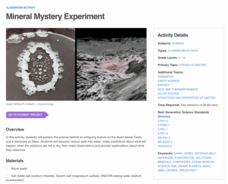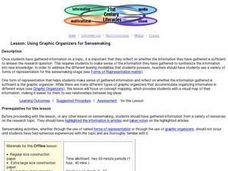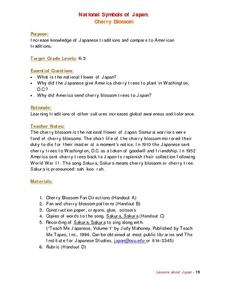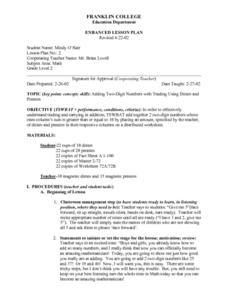K12 Reader
Conjunctions: Or
Flower or tree? Rabbit or goat? Hamburger or hot dog? Young grammarians practice connecting nouns with conjunctions in a worksheet that focuses on using the word or.
K12 Reader
Writing with Subordinating Conjunctions
Challenge young grammarians to turn sets of phrases into sentences by adding subordinating conjunctions on a short worksheet.
K12 Reader
Plurals: Nouns and Verbs Ending in Y
If a word ends in -y, to make it plural you change it to -es, right? Not always! Use a worksheet that addresses both nouns and verbs that end in -y and prompts learners to follow the grammar rule when changing each word.
K12 Reader
S or ES: Plural Words
One frog is fine, but two frogs are better—and more challenging, grammatically speaking! Challenge elementary learners to make six singular nouns into plural nouns with a handy worksheet.
K12 Reader
Identifying Nouns
What's more fun than an afternoon at an art auction? A morning with a grammar worksheet! After reading a short story about Jillian's trip to the art auction, learners jot down every noun from the passage, labeling each one as either...
K12 Reader
Color the Nouns: Kite
Go fly a kite! Young grammarians find the nouns in a selection of words that make up an illustration of a kite. Once the nouns are colored red, the kite is easy to see!
K12 Reader
Conjunctions: Connecting Predicates
Forget walking and chewing gum—the subjects of these sentences can perform several actions at once! Practice connecting predicates with conjunctions in a helpful grammar instructional activity.
K12 Reader
Conjunctions: Connecting Subjects
Having two subjects seems like it makes a sentence more complicated, but it's as easy as adding an extra conjunction! Connect subjects with eight sentences that are each missing an important and.
Center for Advanced Research on Language Acquisition (CARLA)
Bringing the Biodiversity of Ecuador to Spanish Immersion Classrooms
Designed for the Spanish Immersion classroom, scholars take a look at biodiversity and Ecuador; all the while, practicing their Spanish with a focus on verbs. In small groups, learners examine photographs of the different climate regions...
Alabama Wildlife Federation
Watch the Birdie
Many birds look alike until you focus on their specific characteristics—so let's do a little bird watching! Young scientists build their own binoculars to take on a hike. They then use them to locate and identify different species of birds.
Alabama Wildlife Federation
Birds are Everywhere
Wildlife includes all animals that have not been domesticated, both big and small. Young scientists search for all types of wildlife and more importantly for evidence that wildlife is present. As they venture in an outdoor space, they...
Alabama Wildlife Federation
Life in a Pond
What living things call an aquatic habitat home? Young learners consider the question after they discuss the characteristics of a typical pond habitat. They identify an animal and then determine if a pond would have all the components to...
American Chemical Society
Flame Out
Add a little heat to your science lesson. Young experimenters work to understand the chemical reaction taking place when a candle burns. They experiment with both oxygen and carbon dioxide to make conclusions about the reaction.
American Chemical Society
Atoms Can Be Rearranged to Make Different Molecules
Uncover the building blocks of the universe as budding chemists explore atoms and molecules in an exciting inquiry-based activity. Investigators view an interactive video describing the chemical structure of six molecules. Using...
American Chemical Society
Testing Materials to Learn About Their Properties
Storing food in plastic makes more sense than storing it in paper. Young learners research the properties of these materials along with aluminum foil. They then connect the properties of the materials to their usefulness by completing a...
NASA
Mineral Mystery Experiment
One way to study something is to try to replicate it. Young scientists do just that as they use solutions to recreate mineral structures on a dwarf planet. They make solutions with different types of salt, evaporate them, and observe the...
NASA
Comet on a Stick
Since you can't go to the comet, bring the comet to you. Young scientists build models of comets using everyday materials and then participate in a simulation of the interaction between the comet and other bodies in the solar system....
Curated OER
Splish Splash: Daily Use of Water
Students assess their daily use of water and write stories about how water is used in their lives and communities. Students read about water usage in Ghana and Kenya and compare and contrast water usage and resources between the countries.
Curated OER
Winning Resolutions
Young scholars discuss the I Care rules for handling conflicts. They role-play various scenarios using the new rules to handle the conflicts, and complete a rubric to assess each group's conflict resolutions.
Curated OER
Using Graphic Organizers for Sensemaking
Pupils create concept maps in order to assess the information that they have gathered during research. They study the concept map to determine if the research is complete.
Curated OER
National Symbols of Japan: Cherry Blossom
Students participate in a series of lessons that focus on the cherry blossom and its part in Japan and United States relations. They use a variety of media resources to gather information. The assessment is oral for lower grades. The...
Curated OER
Adding Two Digit Numbers with Using Dimes and Pennies
Second graders participate in a math game using dimes and pennies. They practice combining coins to make a given amount of money, and they use the combinations to practice adding two digit numbers. Teacher assessment strategies and...
Curated OER
Original Rhythm Compositions for Poetry
Students create and perform original musical compositions using poetry as a basis for the creative process. This cross-curricular two-day instructional activity can be done in two 45 minute class periods. Students evaluate performances...
Alabama Learning Exchange
Compound Words
Learners identify compound words in the story, "Once There Was A Bull." They work with a partner to discuss what makes up a compound word and participate in a game that helps them to understand the concept better. As the assessment...
Other popular searches
- Standards and Assessment
- Special Education Assessment
- Place Value Assessment
- Math Assessment
- Fitness Assessment
- Assessment Rubrics
- Self Assessment
- Assessment Tools
- Assessment Volleyball
- Math Assessment on Coins
- Reading Assessment
- Dance Assessment























